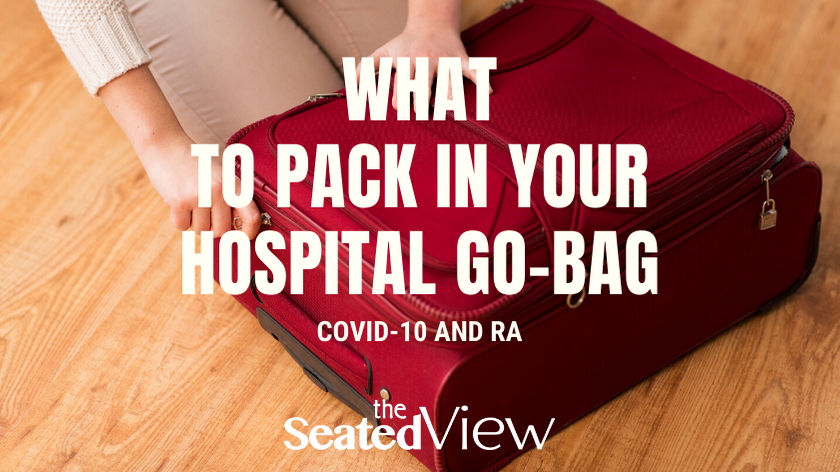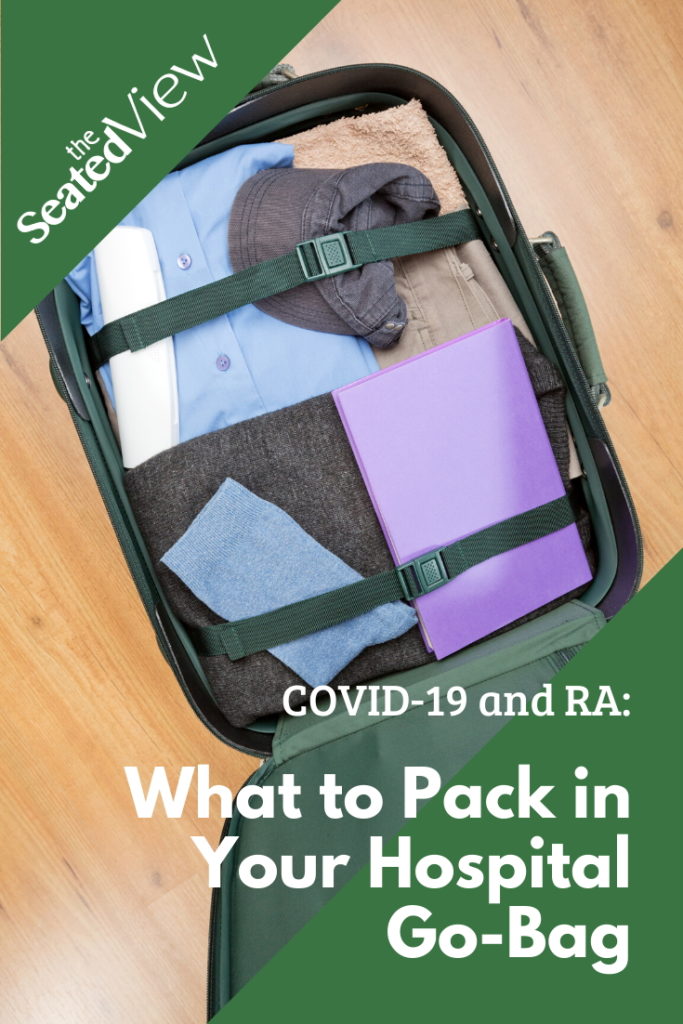COVID-19 and RA: What to Pack in Your Hospital Go-Bag

Living in the middle of a pandemic while being high risk is the most scared many of us have ever been. When you have rheumatoid arthritis (RA) and are taking an immunosuppressant medication, there is a double whammy of risk. We have to consider what might happen if we need to go to the hospital and that can feel extra-scary when you know you’ll be going be going alone — reducing the risk of spreading coronavirus means reducing the people who are with you. Instead of having a low (or medium or high) level of percolating anxiety, you can beat back that feeling of profound helplessness by taking control over part of it. Make sure you’re prepared for a potential hospital trip by packing a go-bag. And really, this is something anyone can do. Because it isn’t just the high risk who are at risk for this.
What is a go-bag and how can it help?
If you have ever been pregnant (or the partner of someone pregnant) you know what a go-bag is. Every expectant mother has been told to pack a bag for the hospital well in advance of labour pains, so you’re ready to leave when the big day arrives and without the panic of trying to remember what to bring.
When you live with chronic illness, especially one that has had you unexpectedly headed for the hospital in the past, having a go-bag ready in your closet can make the whole process easier.
When I headed for the ICU four years ago, it was wholly unexpected, but I did have my partner and my family as backups. While I was unconscious, they advocated for me, but there were things they didn’t know. That experience taught me a lot about emergency preparedness and the benefits of having everything ready in a scary situation.
These are my suggestions for packing a hospital go-bag. Putting yours together might help you pack away some worries, too.

What to pack in your hospital go-bag
Create a document on your computer. Make sure every page has your name and an indication of how many pages there are (such as Page 1/3). Keep it as short as possible — if you do go to the hospital, medical professionals will not have the time to read an essay. Use headings and bullet points.
First, a page with essential information:
- Your name, address, and other identifying information.
- Insurance information (if in the US). For Canadians, health card number, and others — whatever works in your area
- Next of kin names and contact information
- Power of Attorney/Advanced Directive information
Second, medical information:
- Your diagnosis or diagnoses
- List of doctors, specialties, and contact information
- Short medical history, including special notes and medical procedures/surgeries
- List of medication you currently take, dosages, times of day, which doctor prescribed each
- List of supplements (supplements may interact with medication, so doctors should know what you’re taking)
- List of allergies. Make sure you include medication allergies, food allergies, and other allergies
When you have finished this document, print it out, put it in an envelope and write your name on it. Make sure it’s at the very top of your go-bag. You may want to have a couple of copies with you — one to hold, one in your purse, one in your go-bag. Make a copy in a cloud document, such as Google Docs, and share with your next of kin or power of attorney so they can forward the information to the hospital in case yours gets lost. Because hospitals aren’t always good at transferring information, especially in crisis situations.
Now for your personal and comfort items.
- PJs
- Extra pairs of underwear (forget about the bra — you won’t need it until you go home)
- Cozy socks
- Leggings/T-shirt
- Toiletries, such as toothbrush and toothpaste, dental floss, a hairbrush, tissues (you might be crying), deodorant, face and hand cream, shampoo and soap
- Over-the-counter remedies, such as antacids
- Charging cable and earphones for your phone. And while you’re at it, make sure your phone has an updated list of your contacts. Add your credit card number somewhere safe in your phone and make sure you back up the phone now. It is always a good idea to do on a regular basis — if your life is in your phone and the phone goes missing, you don’t lose your digital life
- A book, crossword puzzles, Sudoku, or similar. You may need something to pass the time, but make sure it’s not something that requires too much thinking. It’s next to impossible to think when you’re not feeling well or in the hospital in general
- Mints and a few snacks that don’t require refrigeration. Hospital food usually sucks
- A bit of extra cash
That’s about the minimum — add your own preferred items, but remember to keep it light. Enough to fit into a small backpack or overnight bag. Don’t include anything valuable or something you would deeply miss if it got lost or stolen.
Your family needs information, too
If you’re off to the hospital and potentially very sick, your family needs to have some additional information. Create a list of important contacts who need to know that you sick and hospitalized. This includes family members (if you’re usually in charge of the family contact information), the romantic partner you haven’t yet introduced to your family, friends, colleagues, your employer, volunteer supervisor.
If you haven’t yet set up a Power of Attorney for health and financial matters, do so now. Should you have to go into the hospital, hopefully your stay will be short and you will not need a ventilator. However, if it is a longer stay or you become unconscious, someone else will need to make decisions for you. Your bills need to continue to be paid, so make sure someone you trust with access to your money has your bank account information and the permission to use it.
As well, have those hard conversations about what you want if the worst happens. Do you want heroic measures, like resuscitation or a ventilator? Who is your substitute decision maker(s)? Is there a point when you don’t want heroic measures? It’s not a comfortable conversation to have, but it’s really important for you and your family to know what each other want in that situation — and yes, this goes for all of you. It means that should the time come, you will know each other’s wishes.
And of course, there’s your will. A lot of people who have been putting this off are doing it now. If you have assets, make sure there is some direction in where they should go if the worst happens. If you have children, appoint a guardian, if you don’t haven’t already.
Facing the possibility that you might have to go to the hospital isn’t fun and I sincerely hope we will all be safe. But preparing for the possibility and knowing that you are ready with your stuff and the information your medical team and family will need can give you a bit of peace of mind in these uncertain times.
What’s in your go-bag?
Tag: advanced directive, chronic illness, comfort, go-bag, hospital, pack, pandemic, peace of mind, power of attorney, rheumatoid arthritis, wills
2 Comments
Read More
Discover what else I've been writing about...
















This is such good advice! I hadn’t even thought about it, although I definitely should have.
Thank you for addressing what is probably many of us elephant in the room, I hadn’t given it a thought Lene.
Great information xx